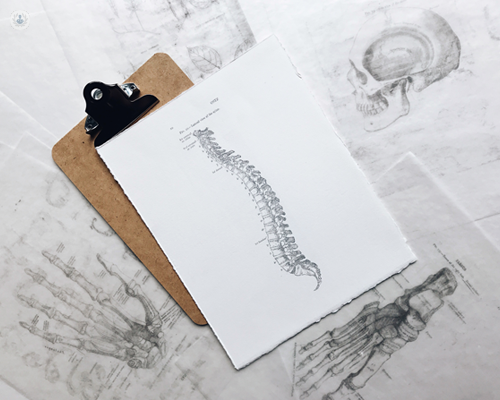Preventing the pain: How to keep your spine healthy for life
Escrito por:Keeping your spine healthy can start with prevention. We take a look at this important topic, here.

What causes spine problems?
Spine problems can develop for a variety of reasons, ranging from poor posture to age-related wear and tear. Common causes include:
- Sedentary lifestyle: Prolonged sitting or lack of movement can weaken the muscles supporting the spine.
- Poor posture: Slouching or improper alignment of the spine while sitting or standing can lead to strain and discomfort.
- Lifting heavy objects: Lifting incorrectly or lifting objects that are too heavy can cause back injuries.
- Ageing: As we age, the discs between the vertebrae in our spine can degenerate, leading to conditions like osteoarthritis and spinal stenosis.
How can I prevent spine problems?
Preventing spine problems requires taking care of your back through healthy habits and proper care. Here are some ways to protect your spine for life:
- Maintain good posture: Keep your back straight and shoulders back when sitting or standing. Use ergonomic furniture to support your posture.
- Stay active: Regular exercise strengthens the muscles that support your spine, particularly your core muscles. Activities like swimming, yoga and walking are excellent for maintaining spinal health.
- Lift properly: Bend at the knees and use your leg muscles when lifting heavy objects to avoid straining your back.
- Sleep on a supportive mattress: Ensure your mattress provides adequate support for your spine, and consider using a pillow that aligns your neck with the rest of your spine.
- Maintain a healthy weight: Carrying excess weight, particularly around the abdomen, can place additional strain on your spine, leading to pain or injury.
How can I manage spine pain?
If you're already experiencing back or spine pain, managing it through non-invasive treatments can help improve your quality of life. Common strategies include:
- Physical therapy: Exercises designed to strengthen the back muscles and improve flexibility can help alleviate pain.
- Pain relief medications: Over-the-counter pain relievers like ibuprofen can help manage discomfort.
- Hot or cold therapy: Applying heat or ice packs to the affected area can reduce inflammation and pain.
- Postural correction: Working with a physiotherapist to correct posture can alleviate strain on the spine.
When should I seek medical help?
If your spine pain persists or becomes debilitating, it's important to consult a healthcare professional. Seek help if:
- Pain lasts more than a few weeks
- You experience numbness or tingling in the legs or arms
- You have difficulty standing or walking
- You notice weakness in the legs or sudden, sharp back pain
Early intervention can prevent further damage and help keep your spine healthy for life.


